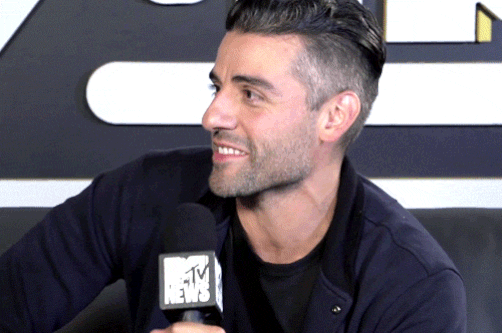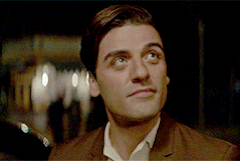
Have you heard the news? We’re all in love with Oscar Isaac now. He’s filling up your Tumblr dash, blanketing your Twitter feed, and featuring in your daydreams. He is the internet’s new boyfriend.
Chris Evans, Rami Malek, Tom Hardy, Sebastian Stan, Idris Elba, Tom Hiddleston, the trope codifier Benedict Cumberbatch — they’ve all had their turn, but the forecast for the beginning of 2016 seems to be all Oscar Isaac. As with others, you can find him in the popular media of the moment. The attraction starts with The Force Awakens and grows from there, finding expression in GIFs, quotes, and photos. When real men disappoint us — in their politics, their bullshit, their basic human inconsistencies — the internet’s boyfriend is a paragon of enlightened masculinity, constructed by committee.

Usually it’s a man with enough mystery to keep these projections of desire from puncturing, but enough charm that his popularity was merely a matter of timing. Usually it’s a man in his early or mid-30s, old enough that a teenager will find him refreshingly mature and a grown-up can lust after him with impunity.
And usually it’s someone surrounded by an aura of authenticity. There must be a conception (whether it’s true is moot) that he earned his current position through hard work rather than dumb luck. There’s often some flaw or idealized vulnerability attached to him or his character — Benedict Cumberbatch didn’t think he was handsome, and plays a character with the emotional intelligence of “a high-functioning sociopath.” Sebastian Stan was an immigrant from a communist nation and plays a character used by the government. Oscar Isaac, Rami Malek, and Idris Elba have all spoken about their worries about being typecast because of their race. Tom Hardy plays a man broken by a dystopian hellscape.
These men might be famous, but the way we share images of them on social media, the way we message our friends GIFs and images and quotes, makes them feel close to us, Hollywood publicity machine be damned. Consuming their work and the media around it doesn’t feel so different from internet-stalking a crush. Have you been firing up your streaming services to look for Oscar Isaac’s films, like Ex Machina or Inside Llewyn Davis or at least Agora? Have you taken this test? Have you shared the videos of him teasing and joking with and generally charming his co-stars? How different is this from posting screenshots of a terrible Tinder conversation online, or taking a deep dive through your crush’s Facebook profile?

But unlike with IRL crushes, there’s an element of authorship to internet love. Tumblr has a tag called “Imagine [male celebrity/character],” where users write romantic one-liners, often accompanied by a pithy GIF or image. Popular fanfiction site Archive of Our Own has pairing tags that go “[main character]/you,” perfect for romantic second-person fanfic. I’m not going to compose short stories about meeting a guy on OKCupid, but I love writing for the “If X were your Y” column on the Toast. For me, the allure is pinning down an attractive personality, of finding the comedy inherent in romance, and vice versa.
It’s crucial that these actors are rarely in romantic movies — or at least, not known for their romantic roles. Instead of being presented to us with boyfriend narratives built in (“Here is a sexy, tormented vampire for you to love”), they offer enough of a blank slate that users can write their own forms of romance onto them. J.J. Abrams is not dictating to us how to love Poe Dameron; we get to set the terms ourselves.
And the terms, it’s worth noting, are the terms of adult romance. We’re not talking about Zayn Malik, the internet’s perpetual friend with benefits, or about Lupita Nyong’o or Jennifer Lawrence, the internet’s perpetual best girlfriends. Oscar Isaac, and the men who came before him, are the positive side of the ironic misandry movement, in which people of both genders joke — but not really — about how men in politics and popular culture often fall short of our expectations. Instead of noting how someone has failed to respect us or listen to us, shaking our heads, and tagging the incident #banmen, we’re holding up our internet boyfriends as a better way to be. If #banmen is a negative expression (what we don’t want), then the internet boyfriend is the positive version (what we do). They’re not necessarily realistic examples. Instead, they’re examples of our shared fantasies — fantasies that no rom-com is able to give us.

To the extent that this phenomenon gets noted outside of the safe spaces of Tumblr and BuzzFeed, it tends to get treated with condescension — a time-honored way to play down the destabilizing power of female crushes since at least the era of Elvis. As a demographic, teenage girls are routinely sexualized, but when they sexualize someone right on back, they get mocked for their attraction. The disdain heaped on grown women, meanwhile, is a bit more implicit, the idea that they’re reaching beyond what they actually deserve.
Personally, it’s always reminded me of the medieval Hindu mystic poet Mirabai, who would write poetry about the Hindu god Krishna, speaking of Krishna as her lover and husband. To understand this type of worship, know that there are a lot of Hindu gods, but Krishna is the one with eight wives and 1,600 girlfriends (!). Once, when trying to describe this idea to a friend visiting my house, I said being his “girlfriend” was a metaphor for faith. My mother snorted at this, implying that she thought he was kind of a playboy.
But for Mirabai, the point wasn’t just her devotion to Krishna. It was about the poetry she created because of it.
Also, whose day isn’t immediately improved by this picture?





